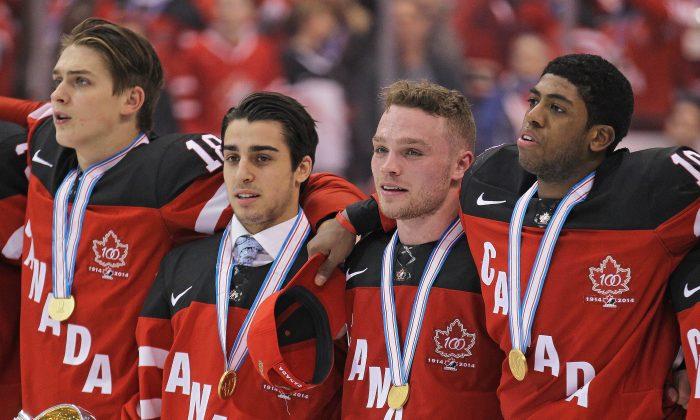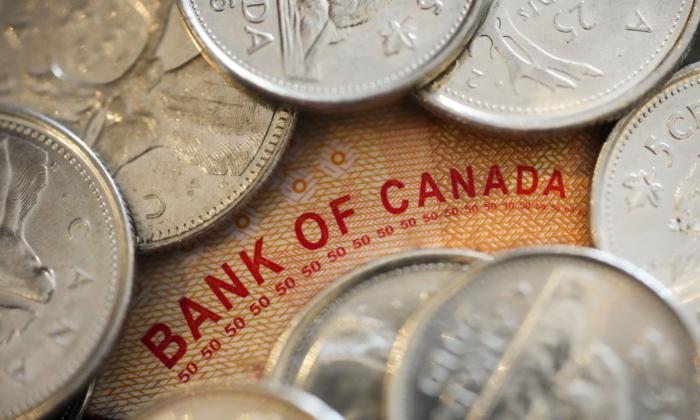Yet another chapter in the storied Canada–Russia junior hockey rivalry is in the books, but this time, Canada eked out a memorable 5–4 win at the Air Canada Centre in Toronto on Monday night.
It’s Canada’s first gold medal since 2009 at this tournament for players under the age of 20 and it banished recent bad memories against its bitter rival.
Here are three takeaways from the gold medal game and the world junior hockey championship tournament overall:
1. Among the best Canadian junior teams ever
Despite Canada nearly blowing a 5–1 lead amid haunting memories of the 2011 third-period gold medal game collapse to Russia, let’s not forget Canada was absolutely dominant in this tournament.
Canada won every game it played without needing overtime or a shootout. Just like the Sochi 2014 men’s Olympic team, Canada never trailed in the tournament. But this junior gold medal team never even allowed the opponent to tie the game after it took the lead. Russia was the only team to outshoot Canada in seven games.
Canada outscored its opposition 39–9 and had the tournament’s top three leading scorers (Sam Reinhart, Nic Petan, and Connor McDavid each with 11 points in 7 games).
The host nation generally showed its discipline in taking the third fewest penalty minutes per game, thought it did get dicey with Russia.
This Canadian junior team is arguably the best squad that hasn’t been helped by having NHLers join due to a lockout. The 2015 team is being compared to the star-studded lockout-assisted 2005 squad that ran away with the gold medal. That is high praise indeed.
2. Canada gets leg up in rivalry with Russia
Russia has had Canada’s number in the world juniors in recent years. Last year, Russia beat Canada for the bronze medal. And of course there was the aforementioned 2011 gold medal collapse by Canada.
These two countries are heated rivals and that was evident right from the opening faceoff with Anthony Duclair and Max Domi jostling with their Russian counterparts.
Early in the first period, the officials had to speak to both coaches to tell their players to settle down. Canada and the U.S.S.R. do have a dark chapter in their history with their bench-clearing brawl in 1987.
When Russia got on the board after quickly falling behind 2–0, goal scorer Dmitri Yudin skated past the Canadian bench clutching the crest on his jersey in a taunting gesture.
Russia would not be intimidated and fought back from a 5–1 deficit with three goals in a 3:16 span in the second period. Perhaps surprisingly—and to Canada’s relief—no goals were scored in the third period.
The game had the added intensity of the decades-old rivalry along with the pressure of the gold medal on the line. It had all the ingredients for a classic.
“You have to be here to believe it,” Prime Minister Stephen Harper said in a brief interview with TSN during the game.
After the heart-stopping win on Monday, Canada now holds a 12–11–1 record against Russia in the tournament, but now, the two nations are deadlocked 4–4 in gold medal games!
Canada has now won gold 16 times in the 39-year history of the tournament. Russia/U.S.S.R. have won a combined today of 13 golds.
“Canada’s back on top of the world,” exclaimed team captain Curtis Lazar.
3. Exciting hockey isn’t necessarily perfect hockey
What makes a hockey game exciting? Tournament hockey helps; lots of goals; momentum swings; few stoppages in play; wide-open play; underdog pulling off an upset; and occasional mistakes. The 2015 world juniors had all of that.
Compared to the pros in the NHL, the world junior players are younger and less experienced. In some sense, they play hockey like Brett Favre played quarterback. Favre was a gunslinger. He'd pull off incredible plays, but he is also the all-time NFL leader in interceptions—never a dull moment with him at QB.
Canadian hockey fans would have loved watching the speed with which Connor McDavid back-checks and strips an opponent of the puck, stops on a dime, and sends a stretch pass to a teammate. Some scintillating individual performances were to be seen.
While the goaltending wasn’t stellar in most games including the gold medal game, Slovakia’s Denis Godla made up for that with his performances against Canada in the semifinals and Sweden in the bronze medal match. Godla was voted the tournament’s MVP.
The Slovaks upset the Swedes who began the tournament with five straight wins to reach the semifinal. It was only the second medal for Slovakia at the world juniors. They came a long way from their opening 8–0 loss to Canada.
The world juniors is an end of year tradition that never ceases to thrill with highly talented teenagers possibly getting their only chance to represent their country. Watching how they deal with the expectations of their nations and their own will to win makes for exciting hockey.
Follow Rahul on Twitter @RV_ETSports





